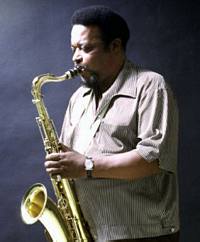| B i o g r a p h y |
 Eugene "Jug"
Ammons (April 14, 1925 - August 6, 1974) was an American jazz
tenor saxophone player, and the son of boogie-woogie pianist Albert
Ammons.
Eugene "Jug"
Ammons (April 14, 1925 - August 6, 1974) was an American jazz
tenor saxophone player, and the son of boogie-woogie pianist Albert
Ammons.
Ammons began to gain recognition when he went on the road with trumpeter King Kolax band in 1943, at the age of 18. He became a member of the Billy Eckstine and Woody Herman bands in 1944 and 1949 respectively, and then in 1950 formed a duet with Sonny Stitt. His later career was interrupted by two prison sentences for narcotics possession, the first from 1958 to 1960, the second from 1962 to 1969.
Ammons and Von Freeman were the founders of the Chicago School of tenor saxophone. His style of playing showed influences from Lester Young as well as Ben Webster. These artists had helped develop the sound of the tenor saxophone to higher levels of expressiveness. Ammons, together with Dexter Gordon and Sonny Stitt, helped integrate their developments with the emerging "vernacular" of the bebop movement, and the chromaticism and rhythmic variety of Charlie Parker is evident in his playing.
While adept at the technical aspects of bebop, in particular its love of harmonic substitutions, Ammons more than Young, Webster or Parker, stayed in touch with the commercial blues and R&B of his day. The "soul Jazz" movement of the mid-1950s, often using the combination of tenor saxophone and Hammond B3 electric organ, counts him as a founder. Often using a thinner, drier tone than Stitt or Gordon, Ammons could at will exploit a vast range of textures on the instrument, vocalizing it in ways that look forward to later artists like Stanley Turrentine, Houston Person, and remarkably Archie Shepp. Ammons showed little interest however in the modal jazz of John Coltrane, Joe Henderson or Wayne Shorter that was emerging at the same time.
Some fine ballad performances in his oeuvre are testament to an exceptional sense of intonation and melodic symmetry, powerful lyrical expressiveness, and mastery both of the blues and the bebop vernacular which can now be described as, in its own way, "classical."
"Answer Me, My Love" written by Fred Rauch, Carl Sigman and Gerhard Winkler, performed by Gene Ammons is featured on the soundtrack for Romance & Cigarettes (2005).